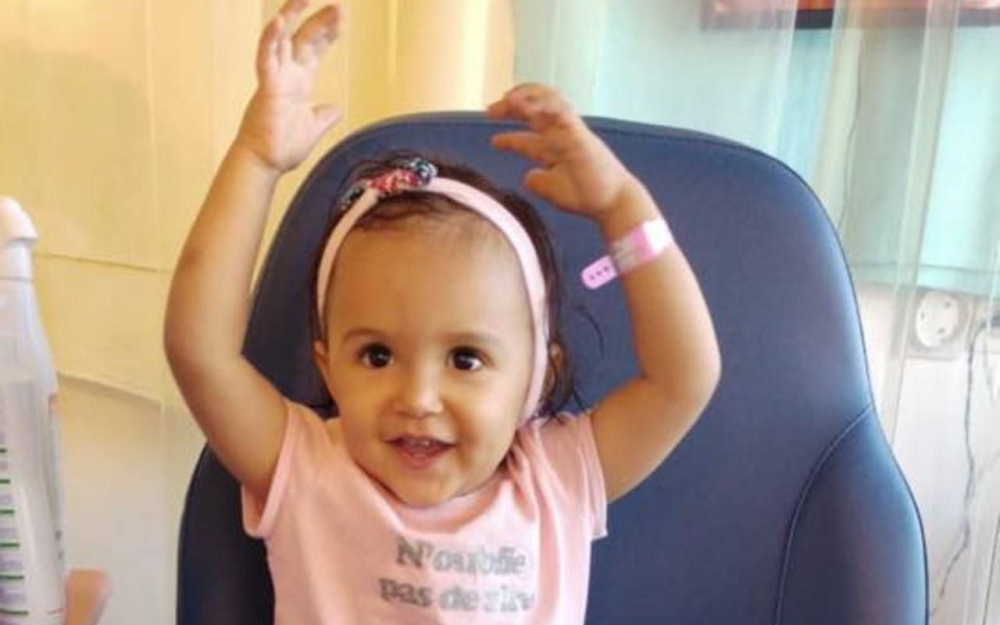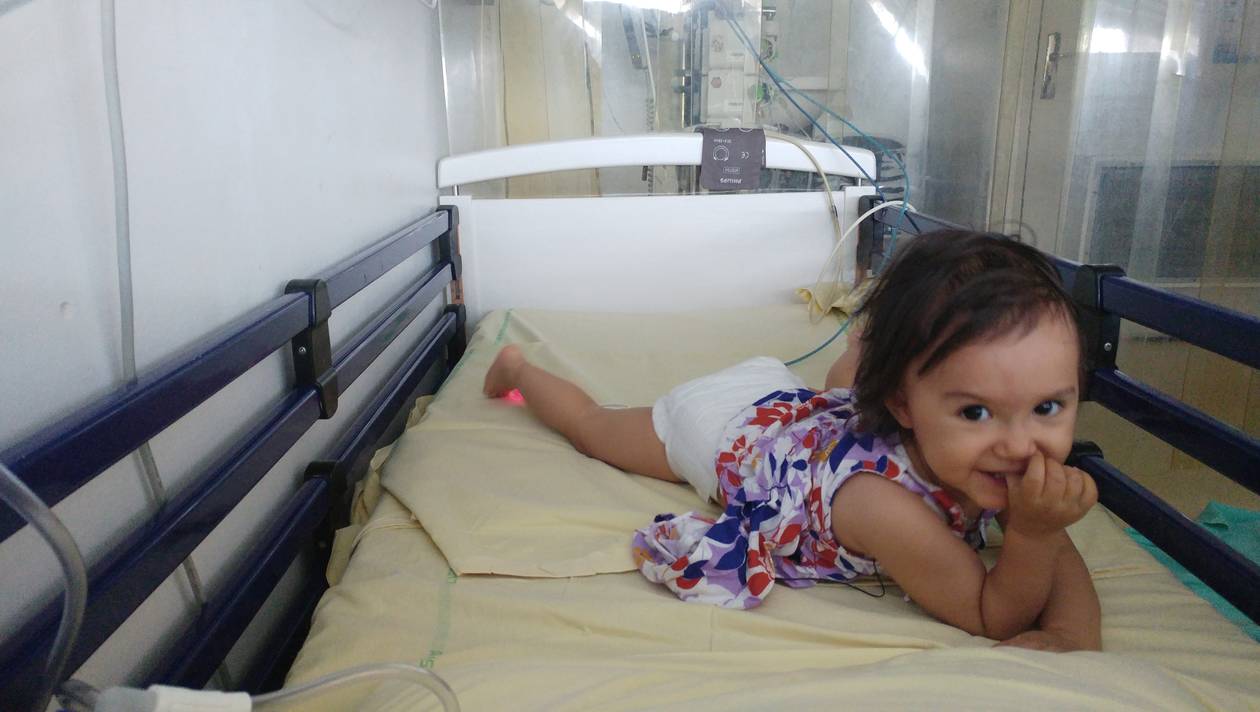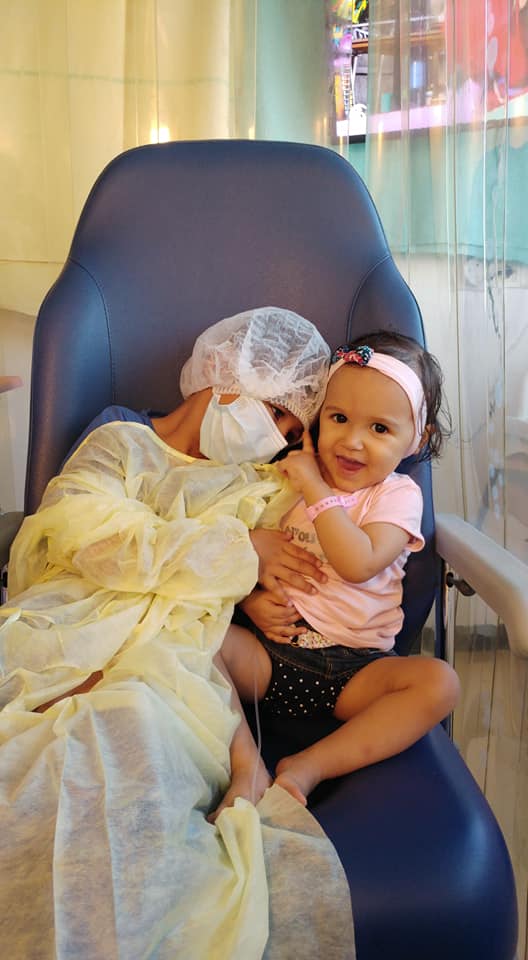अत्यन्त जरुरि सूचना : फ्रान्समा बस्ने २ वर्षीय माइआ लाइ bone marrow दान गर्न वा दाता खोज्न सहयोग गरिदिनुहुन अनुरोध !

केहि बर्ष देखि फ्रान्समा बस्दैआउनुहुने बिश्वेष राजबंशीले आफ्नो २ वर्षीय छोरि माइआ २ महिना देखि Aplastic Anemia रोग बाट ग्रसित भएको र यसकोलागि नेपाली जनसमुदायमा सहयोगकोलागि अपिल गरिदिनुहुन एन आर एन फ्रान्सलाइ अनुरोध गर्नुभएको छ।
उहाको छोरि, माइआको Aplastic Anemia रोगले गर्दा पर्याप्त रूपमा सेतो रक्तकण उत्पादन नहुने र उनलाई अस्पतालमा नै राखेर हरेक २-३ दिनमा रगत दि-राख्नु पर्ने अवस्था छ। अहिले गर्दै आइरहेको उपचारले काम नगरेको खण्डमा २ महिनामा नै उनलाई ( हड्डी मज्जा) bone marrow प्रत्यारोपण गर्नुपर्ने हुन्छ जुन एकदमै दुर्लभ हुन्छ, त्यसमाथि माइआको बुवा नेपाली र आमा फ्रेन्च भएकोले पनि उपयुक्त bone marrow दाता भेट्टाउन झन गार्हो हुनसक्ने डाक्टरहरुको भनाइ छ । कोहि फ्रेन्च र नेपाली मिश्रित वा ( युरोपिएन र नेपाली मिश्रित) आमाबुवा बाट जन्मिनुहुने हुनुहुन्छ भने उपयुक्त bone marrow भेट्ने सम्भावना अलिकति बडी हुनसक्ने रहेछ। तपाइहरुको चिनजानमा कोहि त्यस्तो मिश्रित आमाबुवा बाट जन्मिनुहुने कोहि हुनुहुन्छ भने उहाहरुलाइ यो सूचना पठाइदिनु होला।
Bone marrow दान गर्न को लागी १८ देखि ५० वर्षसम्म उमेरको हुनु पर्दछ र बायोमेडिसिन एजेन्सीमा (Agence de la biomédecine) दर्ता गर्नु पर्छ, त्यसपछि एक मेडिकलमा रक्त परीक्षण गरिन्छ । यो रक्त परीक्षणले तपाईंको HLA टाइपिङ निर्धारण गर्दछ (जसले दानको लागि अनुकूलता निर्धारण गर्दछ) र तपाईले रजिस्ट्रीमा दर्ता गर्नुहुनेछ। दान गर्ने माध्यम केवल रगत द्वारा वा posterior pelvic bone बाट गरिन्छ।
bone marrow दान को बारे मा थप जानकारीको लागि https://www.dondemoelleosseuse.fr/
माइआको परिवार Loiret मा बस्छन र उपचारको लागि पेरिस आउने जाने गर्छन। हरेक दिन बित्दै जादा दान गर्ने कोहि नभेटीएपछि परिवारका सदस्यहरु थप चिन्तित भएका छन ।
सम्पूर्ण फ्रान्सवासी तथा युरोपवासी नेपाली दाजुभाई दिदीबैनीहरुलाइ २ वर्षीय माइआको जीवन रक्षाकोलागि सक्दो सहयोग गरिदिनुहुन हार्दिक अनुरोध गर्दछौं । थप जानकारी माइआको बुवा बिश्वेष राजबंशीजी ले पठाउनु भएको अनुरोधमा उल्लेख गरिएको छ साथै फ्रेन्च पत्रपत्रिकाहरुमा प्रकाशित समाचारहरुबाट समेत जानकारीहरु प्राप्त गर्न सकिन्छ
प्रवक्ता
प्रकाश सापकोटा
एन आर एन फ्रान्स परिवार


बिश्वेष राजबंशीले पठाउनु भएको अनुरोध इमेल :
ENGLISH :
I am a Nepali who has been living in France for the past few years. I am married to a French citizen and we have a daughter aged 2 years old and a son aged 5 years old.
Two months ago, our daughter Maïa was hospitalized at Trousseau in Paris with a rare disease called aplastic anemia. This disease stops Maïa’s bone marrow from producing red and white blood cells and platelets, which means that she needs blood transfusions every few days and has to live in a sterile hospital room to make sure she does not get an infection.
If the treatment she was given a few weeks ago does not work in the next two months, she will need to have a blood marrow transplant to have a chance of being cured. Since her brother’s marrow is not compatible, the doctors will need to search the international database for a donor who is compatible. The problem is that, the average chance of finding a matched donor is one in a million. In Maïa’s case, because of her Nepali-French mixture, the chances are even slimmer.
It is for this reason that I would like to ask the Nepali community in France, especially if they are of mixed Nepali-French origin and would like to help, to get registered on the French bone marrow donor database as soon as possible.
The registration process and all the details of how a bone marrow donation (which is a donation by a living donor without risks for the donor’s health) can be found on https://www.dondemoelleosseuse.fr/ for people living in France.
Here is a quick summary of how a bone marrow donation works:
The process for becoming a donor involves taking an appointment with the donation centre and getting a blood test to determine your bone marrow type (you have to be between 18 and 50 years old and in good health). Your information is then registered in the database.
If a donor on the database is matched and if he or she wants to go ahead with the donation, there are two methods of getting the marrow cells (the doctors decide which method is best for each patient). The blood marrow cells are taken either through a blood transfusion, or by doing a biopsy to extract some marrow directly in the hip bone under anesthesia.
The donor’s own bone marrow cells regenerate naturally after the donation.
In France, the donation is completely free and anonymous.
Different articles have been published in newspapers around France relaying the message (France 3 Centre, Le Parisien, Ouest France). There is also information on Facebook that you can share amongst your friends and family, it could save a little girl’s life.
FRENCH :
Je suis un népalais qui habite en France depuis quelques années. Mon épouse est française et nous avons une fille âgée de 2 ans et un fils âgé de 5 ans.
Il y a deux mois, notre fille Maïa a été hospitalisée à l’hôpital Trousseau à Paris avec une maladie rare appelée l’aplasie médullaire. Cette maladie empêche la moelle osseuse de Maïa de produire des globules rouges et blancs et des plaquettes, ce qui signifie qu’elle a besoin régulièrement de transfusions et qu’elle doit rester dans une chambre d’hôpital stérile pour éviter toute infection.
Si son traitement, qui a débuté il y a quelques semaines, ne fonctionne pas au cours des deux prochains mois, elle devra subir une greffe de moelle osseuse pour pouvoir être guéri. La moelle de son frère n’étant pas compatible, les médecins devront rechercher dans le fichier international un donneur compatible. Le problème est que la chance de trouver un donneur compatible est de un sur un million. Dans le cas de Maïa, à cause de son métissage népalais-français, les chances sont encore plus minces.
C’est pour cette raison que je voudrais faire appel à la communauté népalaise en France, surtout à ceux d’origine mixte népalaise-française, à bien vouloir se porter volontaire pour s’inscrire dans le registre français de donneurs de moelle osseuse dès que possible.
Le processus d’inscription et tous les détails sur la manière dont un don de moelle osseuse (don à faire de son vivant et sans risques pour la santé du donneur) peut être trouvé sur https://www.dondemoelleosseuse.fr/ pour les personnes vivant en France.
Voici un résumé rapide du fonctionnement d’un don de moelle osseuse:
Pour devenir donneur, le processus consiste à prendre rendez-vous avec le centre de dons sur le site web ci-dessus et à faire un prélèvement sanguin pour déterminer votre type de moelle osseuse (vous devez avoir entre 18 et 50 ans et être en bonne santé). Vous apparaitrez alors dans le registre de donneurs.
Si vous êtes sollicité et si vous souhaitez continuer avec le don, il existe deux méthodes pour obtenir les cellules de la moelle (les médecins décideront quelle méthode convient le mieux). Les cellules de la moelle sont alors prélevées soit par prélèvement sanguine, soit par une ponction réalisée directement dans l’os du bassin (acte réalisé sous anesthésie).
La moelle osseuse du donneur se récupère naturellement après le don.
En France, le don est totalement gratuit et anonyme.
Différents articles ont été publiés à ce sujet (France 3 Centre, Le parisien, Ouest France…) et vous pouvez également retrouver plus d’informations sur facebook, n’hésitez pas à partager l’information autour de vous, cela peut sauver la vie d’une petite fille.
Nous sommes touchés de voir tant de personnes se mobiliser pour notre petit rayon de soleil. Elle s’appelle Maia, elle a…
Publiée par Lucile Groisy-Rajbanshi sur Samedi 28 juillet 2018
France 3 Centre :
Ouest France :
Le Parisien :

